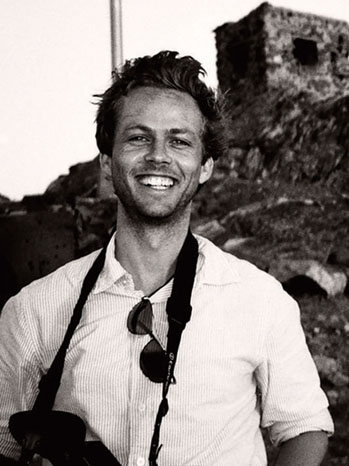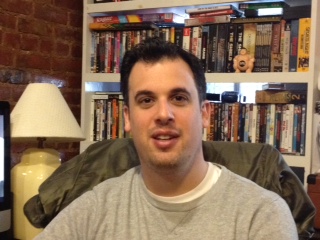|
|
||
|
Pro Tools
FILMFESTIVALS | 24/7 world wide coverageWelcome ! Enjoy the best of both worlds: Film & Festival News, exploring the best of the film festivals community. Launched in 1995, relentlessly connecting films to festivals, documenting and promoting festivals worldwide. Working on an upgrade soon. For collaboration, editorial contributions, or publicity, please send us an email here. User login |
Francophrenia: James Franco Unsheltered
In quantum laboratories around the world you can see an object in two different places at once. Yes, at the same time. Laugh, I used to, but quantum physics is a radical science. I studied electrical engineering, was taught Heisenberg’s theory that atoms are not things but rather tendencies, and still I can’t totally believe that one object can be in more than one place at the same time. Heisenberg was the first paradox in my adult life, something I re-lived watching Francophrenia, an experimental film about James Franco’s appearance in a soap opera. Ian Olds, a hardcore documentarian (Fixer: The Taking of Ajmal Naqshbandi), directed a movie around the making of a General Hospital episode, a scripted behind-the-scenes feature with Franco staring in the movie and guest-staring in the soap. The whole thing takes place during one night at L.A.'s Museum of Contemporary Art. It is both narrative and documentary: a derivative of a movie that toys relentlessly between the actor’s private and public images, celebrity and fans, sanity and paranoia while staying Franco-ubiquitous. We follow him on billboards, chased up and down stairways, talking to anyone on the set, or freefalling from rooftops. My visual feast was only fueled and distracted by Franco’s real life multiple professions. He is a film instructor, a screenwriter, a director, a Ph.D. student, an author, a conceptual artist, a blogger, a film editor and, of course, an actor. For a moment, my consciousness of the movie, of the world, shifted from a sum of events to multiple possibilities at once. Does James Franco really even exist? I lean back at my cab’s seat, on my way to interview Ian Olds at the Hilton in New York’s Fashion District. In Heisenberg’s world, where atoms are tendencies (“atomo” in Greek means person), we are products of tendencies. In that world, a world of possibilities of consciousness, instead of events, multiple Francos could exist. So which Franco was in General Hospital? “The consciousness belongs to the observer,” my engineering teachers told me. “The observer influences the event.” The only problem is that in our world of cabs, movies, and popcorn, we don’t really know who the hell the observer is. How about the guy behind the camera: “Ian!” I shake Olds’ hand. “Thank you for your the interest in the movie,” Ian refers to my email where I linked Francophrenia to Greece, my homeland, currently obsessed with Turkish soaps during the perfect financial and social storm. An Eddie Redmayne lookalike (the ginger hair, the Vanity Fair smile) Ian mixes clean looks with dirty boots. There’s something Byronesque about Olds, like a kid who plays piano and yet volunteers to go to Haiti—could these very kicks been to Afghanistan during the Fixer? “I admire your work,” I confess. “So far,” I specify and he gives me a shy smile that makes it impossible to guess his age. We get seated and I start by saying that during the first part of Francophrenia the camera almost hates Franco. “We see him as a contemptuous narcissist, at times obnoxious,” I explain and Ian grins, so I go on. “He gives a speech like a stoned Brando projected on a wall-sized screen.” Ian doesn’t get defensive, actually he looks amused. He’s a good listener something that makes me feel like I’m on the shrink’s couch. I tell him that in the second part his star finally relaxes. People working on the set—men of labor, non-actors and black transsexuals—make Franco look like a child in a tux that wants to seduce us. He appears as a handsome angel, no hint of the demonic James in him. Until a claustrophobic paranoia gets him obsessed and hateful again. Then Franco gets as vulnerable and bipolar as the trapped character struggling to break out of the comic-book frames in Aha’s Take On Me video. Ian looks like he’s enjoying the road I’m heading. He gets the phases I describe and acknowledges the unnecessary angst of his protagonist. “But everything’s unnecessary,” he states. And he justifies his meta-movie by highlighting “the surreal amount of labor and energy that goes behind this soap mediocrity, this celebrity-driven spectacle.” “Then why did you do it?” I ask. “Ian, if we agree that the output is an expensive nothing then what’s the point? By showing this negative return on investment, you are either legitimizing my mother’s obsession with soaps, or your are exposing it, calling it absurd. Which one is it?” “I’m not sure that what you are asking me is part of my job to answer. Part of the artist’s job to answer,” Ian replies. “Sustained,” I murmur. “But you did the Fixer. Whether you want to admit it or not, your work is political. You can’t deny people’s love for disposable culture. It’s real. Your work has implications.” “When you dive into an experiment, you have to be comfortable with the possibility of failure,” Ian says and checkmates me. “Looking forward, I’m more interested in fiction,” he adds, and bang! I get it. From Afghanistan, to hyper-tinsel-nothing, to fiction, Ian and his boy are getting away with “parallel universes.” Well, not in my interview. I won’t give them a free pass to their quantum existence, not yet anyways. “Let me tell you a story,” I say and Ian looks genuinely interested—again, a sport. “During my post-MBA dry-clean-only white-collar life, I used to run into one of my VP’s in the elevator. This rich son of bitch to whom I had repeatedly presented to—solid work mind you—would not give me the time of day. Then a janitor might step in and he’d stop BlackBerrying to say hello to him. Are you guys soap-experimenting with a similar a politically correct guilt? Cause I can’t tell what’s going on here,” I say, and I seriously can’t: Franco’s Gioconda smile has been fixed on his face since the first time I saw him at GQ’s 50-years party in Milan in 2007. I remember him browsing the hangar-sized Felliniesque tent full of men (it was Men’s Fashion week) with his politely sardonic beam that made it impossible to assess pleasure or irony. Was he doing the late Alexander McQueen a favor, or was he just having a good time? Was his Oscar-hosting a performance art or just a juvenile bet to see if he could get away with it? Is his life art or is he merely pushing the envelope, taking more and more risks and shrugging them off? Is he an Andy Warhol or an Ayrton Senna? “I really can’t tell,” I say, tired of possibilities and paradoxes. I want them to take a position on their experiment. Ian looks at me curiously. “Shots are thoughts. You don’t see it, but there is a butterfly effect,” he says. He’s talking “Heisenberg,” to me, and that suddenly makes me the observer. Franco’s paranoia from the movie gets under my skin. Franco’s actual lines echo in my mind: ‘This is crazy,’ I hear Franco’s ghost whisper. ‘I got to get out of here. Everything will be alright.’ I am inside Francophrenia now—as the observer I can choose to be there. My mentor Ira Sachs was Ian’s teacher at Sundance. I invite him to Ira’s premiere party. Ian is pleased and handsome. ‘I got to kill him,’ Franco fucks with my mind. Ian hands me a white business card that has his digits in white font. Really. ‘I didn’t go to grad school for that,’ Franco within me says.
Follow Ioannis Pappos on Twitter: www.twitter.com/IoannisPappos
25.07.2012 | Tribeca Film Festival's blog Cat. : actor Afghanistan Alexander McQueen Artist Author Contact Details editor energy Entertainment Entertainment forward General General Hospital Greece Haiti Human Interest Human Interest Ian Olds Ian’s teacher instructor , a screenwriter Ioannis Pappos Ira Sachs James Franco James Franco janitor L.A. Milan Museum of Contemporary Art Natural Disaster New York Oscar Person Career Person Travel Ph.D. Private Quotation screenwriter , a director Sundance teacher at Sundance the Vanity Fair Tribeca Film Festival Turkey VP www.twitter.com/IoannisPappos PEOPLE
|
LinksThe Bulletin Board > The Bulletin Board Blog Following News Interview with IFTA Chairman (AFM)
Interview with Cannes Marche du Film Director
Filmfestivals.com dailies live coverage from > Live from India
Useful links for the indies: > Big files transfer
+ SUBSCRIBE to the weekly Newsletter Deals+ Special offers and discounts from filmfestivals.com Selected fun offers
> Bonus Casino
User imagesAbout Tribeca Film Festival Online Dailies Coverage of the Tribeca Film Festival, April 17-28, 2013
The Tribeca Film Festival brings together local, national, and international talent to provide the New York City, downtown community with five days of screenings, educational workshops, and various special events.
View my profile Send me a message My festivalThe EditorUser links |




























